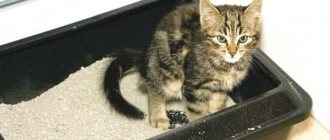Many domestic cats engage in entertaining games with electrical wires, which is very alarming to caring owners who are worried about the consequences. In our article today we will talk about the reasons for this behavior and answer the main question - how to stop a cat from chewing wires. It should be noted right away that interest in cables and wiring mainly manifests itself in small pets. Adult cats are less active, so playing with such products is observed in extremely rare cases.
So, if your furry friend has started chewing the wires in the house, our article will help solve this problem as quickly as possible. First, let's look at the main reasons why cats chew electrical wires.
Why is a cat attracted to wires?
There are many reasons why felines are attracted to wires from electrical appliances. First of all, this is an interesting item to play with. What else makes a cat touch a moving wire:
Read also: Teenager sleeps a lot
- Itchy teeth Baby teeth are replaced by molars. At this time, the kittens' gums may itch quite severely, and they begin to chew on everything, including wires.
- Oral diseases and plaque Stomatitis, gingivitis, periodontal disease are diseases that require treatment. Your cat may chew on wires to scratch and soothe sore gums. Cats also use wires to try to clean plaque.
- Boredom If a cat has nothing to do and is often left alone, he may chew things. Wires are no exception.
- Lack of attention If the owner of the house does not pay attention to the pet, then most likely the cat will want to attract him and will do something that is not allowed. For example, it will start biting the TV wires while you are watching it.
- Lack of nutrients in the body A lack of aluminum or copper in a cat’s body provokes strange food addictions. Wires can make an attractive snack.
Causes of addiction
The main reason lies in the curiosity of the cat. The baby learns about the world through smell, taste and touch, trying out all the interesting and new objects by heart. In addition, kittens chew wires because:
- They are teething and hard objects help relieve itchy gums. During this period, kittens chew everything they come across.
- They look like various toys - fishing rods, ribbons, “swings”. Loose wires are a tempting object for playing with them, since cats are attracted to the movement, which awakens in the baby the instinct of the “great hunter” of dangerous snakes or lizards, which thick cables or thin wires from headphones are so similar to.
- The smell of the insulating material attracts cats. Pets like plastic. You can often see a cat licking a plastic bag. Obviously, the material emits some special aroma, inaccessible to the human sense of smell, but attractive to a cat.
An adult animal. Mature mustachioed tabbies can also chew wires when:
- The diet does not have enough solid food that can maintain oral hygiene - massage the gums, clean teeth from plaque.
- Not enough attention. You should observe the behavior of the pet; if it chews and glances slyly at the owner, then in this way he invites to play and demands attention to his own person. The cat understands that the most effective way to attract attention is to do something that is forbidden - scratch furniture, tear wallpaper, chew wires. Even the busiest owner will be distracted and pay attention to the person of the furry robber.
- Boring. Pets often experience a lack of impressions. If there are no special slides, exercise equipment, or educational toys in the room, then the animal receives positive emotions and new impressions with the help of improvised means.
- There are not enough vitamins and microelements in the food that the owner gives his pet, and he tries to find what he needs in inedible items.
- There are mental disorders that cause a perversion of taste and a desire to eat inedible things: sand, pebbles, paper, rags, wires.
Most likely, the cat has good reasons for gnawing wires, so it should not be scolded for such “tricks,” much less beaten.
The cat, acting for his own understandable reasons, will perceive the punishment as an insult and will take revenge, losing trust in the owner and contact with him.
First way: hide everything
It is also the most effective, with a 100% successful outcome. Hide all the wires in cable channels, in special corrugated tubes, or nail the wires to the wall, at a height of about 50 cm. But, unfortunately, these options are good when you start renovating an apartment from scratch, but in reality we change apartments and are forced to adapt already to those outlets that existed before us. Therefore, we take this method into account for the future, when we buy an apartment for self-finishing and do everything for ourselves and our beloved pets.
We stop chewing wires
Of course, you can’t beat the cat for these pranks. Felines are very touchy and will remember your brute strength for a long time, and if necessary, they will take revenge. Stop the attack on the wires calmly and methodically.
Firstly, the wires can be saved if you take simple measures:
Read also: Why the rose does not bloom in the garden
- cable channels in the form of closed profiles on the wall will reliably hide the wires;
- fix the wires on the wall with tape at a height of at least 50 cm;
- wrap them with double-sided tape, which the cat will not like;
- Wrap it in foil for a curious kitten - it crunches terribly;
- Place all little-used extension cords away.
Secondly, there are home and store-bought remedies to wean a cat off its love of wires. Look for them in veterinary pharmacies or pet supply stores (sprays like Antigryzin). There are budget and expensive sprays. These products are safe for cats and people, they do not leave any traces.
Home remedies:
- citrus oil – emits a pleasant aroma that cats cannot stand. Lubricate wires with it or place citrus peels nearby. When the smell weakens, replace it;
- aloe juice, garlic or onion, and mustard taste bitter. They will keep the cat away from the wires, but you will have to endure the strong smell;
- a can of compressed air - keep it nearby. When your pet starts chewing on the wires, go over and give it a whack. Usually animals are afraid of this. The cat will understand the cause-and-effect relationship.
Psychological influence is an effective weaning method. If you see the cat walking towards the wires or already biting them, make a loud sound. Clap your hands, place your hand on the table, or call your pet sternly. He must realize that unpleasant noise follows prohibited actions.
Dangers that an animal may encounter when playing with bags
After playing, your pet may tear the bag and swallow part of it. Polyethylene is very negatively perceived by the cat's digestive tract, especially if the animal is older than 7 years.
Important! Self-medication and attempts to induce vomiting are unacceptable; it is important to contact a veterinarian as soon as possible. A piece of cellophane stuck in the throat can cause a cat to suffocate, so postponing a visit to the clinic in the hope that it will go away on its own is unacceptable.
A piece of cellophane stuck in the throat can cause a cat to suffocate, so postponing a visit to the clinic in the hope that it will go away on its own is unacceptable.
Sacks, boxes, bags - these are the best resting places for cats
Several ways to fix the problem
Before you decide what to do if your cat is chewing on wires, you need to determine the exact reason for this behavior. We have listed all the possible factors that provoke a kitten to such actions. Now let's look at several effective ways to wean your pet from such dangerous and thoughtless games with wires.
Shorten or hide the wires
The best solution is to remove wires and cables from free access. If there is no possibility of moving it to a hidden place, use special accessories to “hide” the wires from tailed family members.
Specialized stores sell various boxes and corrugated tubes that allow you to protect your living space from the rash actions of children and animals.
We use sprays
Veterinary pharmacies and pet stores sell special sprays that have a special smell that repels cats. These compounds can be used to treat not only wires, but also other places where a small predator likes to “spoil.”
Anti-rodent sprays do not have a pungent odor that is unpleasant to humans. As a rule, the main aroma of such products is citrus. Cats cannot stand the smell of lemons and oranges, so if a special spray is not available, you can use fresh juice or the peel of these fruits.
Loud sounds
Don't know how to stop a kitten from chewing wires? Try raising a little mischief maker using a loud tone for the “no” command. Teach the rules of the ban from an early age, which will allow you to raise an obedient cat with good manners.
To quickly scare the kitten away from the wires, you can use loud sounds, for example, clapping your hands. Experts also suggest using balloons.
If you hang it on a cable that is especially attractive to the animal, you can quickly wean the kitten from playing with a dangerous cord. During the game, the ball may explode, which will scare the little mischief-maker. As a rule, attempts to get closer to an interesting product after such an incident are not repeated.
We use improvised means
The cat chews wires for the first time, what should I do? We use everything we have at hand to scare away! For example, a baby rattle or a bell for a sound effect.
Water distracts cats' attention very quickly. You can direct a stream of refreshing liquid at the playful prankster using a spray bottle or a children's water pistol. But, be careful not to allow water to come into contact with electrical wires and sockets!
What to do if your cat chews on wires in your absence? In this case, you need to treat the surface of the cable using a spray or improvised means. A good repelling effect is observed when lubricating the wires with cinnamon, citrus fruits, ammonia, vinegar or cologne.
Any of the above methods will help solve the problem quickly. To choose the right weaning method, try to find out the main reason why your cat chews wires.
And, most importantly, never use physical force in raising your tailed friend, even if he often breaks the rules of behavior in your home!
Fighting a bad habit
Many years of experience in friendship between humans and tailed animals have developed effective ways to overcome the problem. The easiest and simplest, and also the most effective way to wean an animal from chewing wires is to hide them in an inaccessible place, thus depriving the cat of access to them at all. If you are getting a cat, keep this point in mind. Move the wires away from the room or hide them in cable ducts for his safety, while you yourself do not know the disposition and habits of your pet.
When there is nowhere to hide the wires in the house, think about what substance or product you can treat them with so that the kitten does not want to get close to them. You can use lemon, which is used to make preparations that stop cats from chewing cables and wires, tearing up furniture throughout the house with their claws, and marking the space in each room. Citrus or aromatic grapefruit oil is used to treat the surface of objects that attract a cat.
There are cat breeders who treat objects with a clove of garlic, pre-cut, ground pepper or mustard. Do not repeat such steps, not only because a long-lasting unpleasant odor will remain in the apartment, but also because the pet may completely lose its sense of smell due to pepper getting into its nose. After all, for a cat, the loss of smell is equivalent to the loss of vision in a person.
The smell of citrus does not linger on the surface of the wires for long, so you can wrap them with insulating tape or tape. Cats are squeamish about sticky surfaces.
Many cat owners rub the wires with aloe juice. The juice of the plant is very bitter and can cause the animal to drool profusely. Therefore, he definitely needs to rinse his mouth with water. This method is not entirely humane, but it is justified in contrast to the possible death of the pet.
If there is a small kitten in the house, then the wires can be treated with anti-gnaze and give it Greenies treats especially for cats with the taste of fish and chicken. The treat will massage the cat’s teeth, and he will not want to chew on cables and wires after it.
How to avoid the problem
Try to find other ways to stop your cat from chewing on wires. For example, these:
- Buy him a soft toy from the veterinarian that he can fiddle with and chew on.
- Pay more attention to the kitten, play with it more often.
- Buy your pet special vitamins containing taurine and iron. Today there are a large number of vitamins, the intake of which can save cats from bad habits.
- Change your cat's diet in consultation with your veterinarian.
- Check the animal for worms.
Stop your cat from chewing wires from childhood, because later it will be much more difficult to do so.
What not to do
There are a number of taboos in overcoming the problem. An attentive owner should take these into account:
- Do not use cruel methods to combat the animal's habit of chewing wires.
- Do not use chemicals that may harm the kitten's health.
- Do not use a stream of water from a spray bottle or water pistol for weaning.
- Do not harshly punish an animal for chewing wires. Indeed, in each case, our pets, not speaking, try to tell us about their problems. How they do it is another question. But in each specific case you must understand and take appropriate measures.
Have restraint and patience, and everything will be fine. Know that animals love you very much!
Some useful tips
If the kitten chews on electrical wires and the methods described above did not help, adjust your pet’s diet. If the cat is kept on a natural diet, after consulting with a veterinarian, supplement the diet with multivitamin complexes, vitamin-mineral supplements, probiotics, and enzyme agents. Offer your cat grass, fresh herbs, and chewing bones.
If your cat receives ready-made food, give preference to products of proven brands, trademarks and only “premium” and “extra” class.
Monitor your pet's oral hygiene and dental condition. Once every two weeks, brush your cat’s teeth using a soft brush and a special paste for animals. This procedure is unpleasant for cats, so it needs to be taught to them from an early age.
Make your cat's leisure time active and varied , especially if the cat does not walk outside. Build a playground and buy toys. Kittens love to play with wind-up mice and balls. To prevent your cat from getting bored, pay more attention to your pet.
Even if the problem does not resolve immediately, be patient. Wean your cat off this bad habit gradually. If you use various methods and learn your pet’s habits, over time the cat will definitely understand and understand that gnawing and playing with wires is prohibited.
Wire insulation methods
Get ready for the fact that cats are very stubborn and are able to reach the cable in the most impossible ways.
The simplest and most effective means of protecting cables is their insulation. It helps protect the integrity of the cable and reduces risks to the animal's health.
Table 1. Wire insulation methods
| Method | Implementations and notes |
| Cleaning | All unused wires must be removed out of reach of the animal. Chargers can be hidden in a closet, in a table or on a high shelf. And those cables that are used less than a few times a week can be put away in a special box |
| Tubes | The most convenient way is to hide constantly used wires in special tubes. Cats also show interest in cables because they are small in size and therefore easy to chew on. Tubes for wires are sold at building supply stores. They are large enough that cats cannot damage them, making them great for protection. |
| Ties | Ordinary construction ties can also help insulate cables. When the diameter of the wire increases, the purr becomes uninterested in playing with it, and it becomes more difficult to chew on it. Therefore, this method also helps to protect the cables and put them in a certain order. |
| Fastening to furniture | Those wires that cannot be removed and hidden are recommended to be secured to the furniture as much as possible so that they do not dangle. To do this, you can use a construction stapler or special fasteners. |
| Skirting boards | An excellent way to insulate is baseboards. Modern models have special sections for wires. If there are no such compartments, you can disconnect the baseboard and lay the cable under it. This method will not only protect the pet, but also preserve the aesthetics of the room. |
| Treatment with special substances | There are a number of substances whose smell repels cats. But here it is important to maintain a golden mean - not to choose scents that will make the owners feel unwell and at the same time periodically refresh the treatment |
| Double sided tape | Cats really do not like sticky substances and surfaces, and therefore one of the insulation methods can be called double-sided tape. Your pet is guaranteed not to play with the sticky cable. But this method has its drawback - dust and pet hair will constantly collect on the sticky surface, and therefore the wire will quickly look untidy |
| Foil | Despite the fact that foil can rustle interestingly and shines quite brightly, cats do not like to play with it. The reason for this is the alkaline taste that appears when you chew it. Therefore, this method can also be used as protection for cables. But there is a possibility that the animal's interest will be renewed after the foil is removed |
What to do with kittens
Kittens are the most curious, because they are just beginning to learn about the world around them. Therefore, like small children, they are interested in touching and tasting unfamiliar objects. Under no circumstances should you beat or punish a kitten, because it may not understand what it is doing wrong.
It is important to be patient and try to wean your pet from a bad habit in humane ways:
- Provide the kitten with enough toys.
- If possible, insulate and hide cables located on the floor.
- Store cables, chargers, headphones, etc. in a place inaccessible to the kitten.
- Feed your pet a balanced mixture and periodically give vitamins.
- Spend more time communicating with the animal.
- Maintain the hygiene of your pet's teeth.
Behavior adjustment
In order to wean your pet once and for all from the dangerous habit of chewing wires, as already noted, you need to eliminate the cause.
Remember! Rough physical methods, disrespectful attitude, shouting, and especially beating will not help in this situation.
This approach will only embitter the animal and the cat may begin to do everything to spite you. Show consistency in actions and persistence. Be patient. Cats are smart, quick-witted, but rather capricious and stubborn animals.
You need to teach your kitten good behavior from an early age. You can begin parenting when the baby is completely accustomed to the environment and the members of his family. From an early age, an animal must clearly understand what is allowed and what is prohibited. Adult cats are more difficult to train and it is almost impossible to eradicate some “bad” habits.
Method No. 1 If a kitten or adult pet shows interest in the wires, plays and chews on them, you need to immediately stop this behavior. At the same time, the simplest and most effective method that will wean a cat from gnawing wires is to remove them from the animal’s reach and visibility. For the safety of your furry pet, and also if you just got a kitten and don’t know its habits and manners, hide them in places inaccessible to pets or, best of all, place them in special cable channels (corrugated tubes, boxes).
Advice! Make sure that the wires do not resemble cat toys (ribbons, strings, laces).
If the electrical cord hangs from the table, it will attract your pet's attention. Insulate the wires behind the furniture, secure them tightly to the walls and floor. In this case, they will become unattractive for the game. Several wires can be fastened together with special clamps. Thick “bundles” of cables are less attractive to cats than individual cables.
Method No. 2 When charging your phone or other electronic devices, place them on elevated surfaces or in places that are difficult for your cat to reach. Stores sell special devices in which the telephone is placed and the entire structure is connected to the outlet.
Do not leave devices charging overnight as cats may become active at night. After charging, hide the devices in places inaccessible to the animal (cabinets, bedside tables).
Be sure to block any gaps between the floor and the bottom or the wall and the back of electrical equipment and household appliances. Don't forget that cats can easily get into small holes.
Method No. 3 The following simple and effective methods and available means will help you stop a kitten from gnawing on wires, including:
- repellent odors, special repellents;
- diet adjustments;
- "Antigrisin";
- aloe juice;
- foil, double-sided tape;
- severe reprimand, harsh sounds.
Method No. 4 As soon as the pet shows interest in the wires, use a stern tone and clap your hands to scare the cat away from the object that interests him. Spray your cat with water or use an empty can of compressed air. Cats are afraid of loud, sharp, hissing sounds, pops, and rustling objects. Movements and repellent actions should be unexpected for the cat.
Method No. 5 Lubricate the entire surface of the electrical cables with something tasteless, for example, mustard, onion, garlic gruel, lemon juice, essential oils with a strong pungent odor that will scare away the little playful.
Important! Do not use substances, mixtures, medications, or chemicals that are toxic to cats, which can cause severe poisoning, intoxication, allergies, or harm the pet’s health.
Many cat breeders recommend treating wires with aloe juice. The bitter taste of the medicinal plant will not harm the cat, but will provoke profuse drooling. Therefore, after the “lesson” taught, you need to pour boiled water into your pet’s mouth. Despite the inhumane nature of the method, it is very effective and the cat will forget for a long time what it is like to chew wires. Also, many felines do not like the smell of citrus fruits. If you don't have aloe, you can use orange peel.
Method No. 6 Buy “Antigrisin” at veterinary pharmacies and pet stores. Lubricate the wires with it. Wrap the cables with foil and double-sided tape. Cats simply hate sticky things.
What to do if your pet is electrocuted
It is not easy to stop a cat from chewing wires, especially if the animal has this bad habit in old age. It happens that if the owner is at home, the cat restrains himself, but still continues to play around when left alone (alone at home or alone in the room).
What to do if a cat has all the signs of an electric shock (pallor or even cyanosis of the mucous membranes, arrhythmia and slow pulse, convulsions, weakness, breathing problems, minor lesions on the skin, loss of consciousness)? If the owner is lucky and notices an electrical injury in his purr in time, he needs to act like this:
- Stop panicking. You cannot immediately scream or grab the cat without rubber gloves (this can lead to an electric shock);
- If possible, you need to pull out the faulty wire from the socket using something non-metallic (a wooden mop, a broom, you can pull it out with your hand, but with a rubber glove). If you cannot pull out the wire, you must at least throw it off the animal;
- Then the cat needs to be raised in the pelvic area so that the lower legs are higher than the level of the head. Another option is to lift the cat by its hind legs and twist it a little. This must be done to provoke blood flow to the brain;
- If about 15 seconds have passed and the animal has not regained consciousness, you will have to perform artificial respiration, exhaling air from the pet’s mouth into the nose 12-15 times per minute (each exhalation is about 5 seconds). The pet should be laid on a flat surface on its right side. It is important to ensure that your pet exhales air. Simultaneously with artificial respiration, it is advisable to massage the heart by pressing on the chest, as if lifting the ribs to the neck. You need to do about 100 pressures per minute. If there is a family member at home, you need to ask him to urgently call a veterinarian at home. A specialist will be able to resuscitate the animal better and faster;
- If the pet has come to its senses, it needs to be calmed down and then given some water to drink. An electric shock burn can be lubricated with sea buckthorn oil, Solcoseryl, Levomekol or other similar ointment. You definitely need to make sure that the mustachioed striped one does not approach the faulty wire again.











